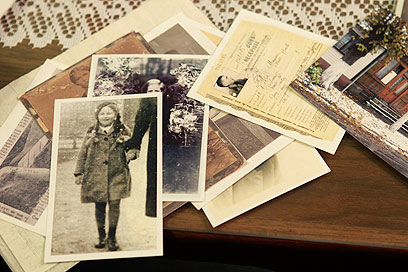Deluty's parents and sister were killed in the Holocaust and his father's grain warehouse was destroyed. But the family home still stands – and the 87-year-old Deluty, who now lives in Queens, New York, says he deserves to get the property back, or at least compensation. He is the rightful heir and desperately needs the money as mounting medical costs eat up his meager income.
But a Polish judge told him he has no rights to his family home when he visited years ago, "because 'you did not come back to live here.'"
And now, he's all but given up hope of ever winning the battle for his house because the Polish government recently decided to suspend work on a law offering compensation to people who had private property seized during the Nazi and communist eras.
Deluty says he's running out of time and energy, and has a message for Poland's government: "Shame on you for what you are doing to (Holocaust) survivors in this time of their great need."
The US government also expressed its disappointment over the failure to pass a law that affects both Jews and many non-Jews, sparking an angry outburst from Poland's foreign minister, who made it clear he didn't appreciate a lecture from Washington.
The government of Prime Minister Donald Tusk argues that the financial crisis has left it too broke to pay even partial compensation for seized property.
Europe's largest Jewish community
Government spokesman Pawel Gras said that if the law took effect, the state would have to immediately pay out 20 billion zlotys ($7.3 billion) to former property owners. He said it's an obligation "impossible" for the debt-burdened state to meet for the next two years.
That marks a change of tone from 2008, when Tusk vowed during a visit to Jerusalem to get a law passed. "There is nothing worse than saying I'll give it back, and then not doing so," Tusk said at the time.
Now that Tusk is not doing so, many are furious.
"Any democratic country which claims to practice democracy and good human behavior has to practice it. Otherwise, it's a farce," Deluty said during an interview at his Queens home. "How can they be democratic when they're violating such human rights?"

Memorabilia from Maurice Deluty's youth (Photo: AP)
Even Poland's President Bronislaw Komorowski condemned the decision to stop work on the law, calling it "a disgrace for Poland."
Komorowski, who is aligned with Tusk's governing Civic Platform party but is elected separately from the government, also acknowledged what many critics frequently note – that Poland is the only young democracy from the former East Bloc that hasn't passed any re-privatization or re-compensation law.
The government says it will resume work on the law sometime in the future – but that will be too late for many of the elderly people who were dispossessed.
The issue is often described as one of "Jewish restitution" but in fact only about 15% of the seized property in question is claimed by Jews, with the bulk of it claimed by non-Jewish Poles who owned homes, factories and other property.
Still, the issue weighs heavily on relations between Poland and Jewish groups due to its unresolved nature and the fact that before the war Poland was home to 3.5 million Jews – Europe's largest Jewish community.
In some cases, the land was first seized by the Nazi German occupiers and then taken over by communists in the postwar era. Sometimes it came as part of a communist policy of dispossessing aristocrats or others of privilege – or simply because the state coveted the real estate.
'Like talking to a dead wall'
People have been struggling for years to regain property, and some have succeeded through the courts. Many others fail.
Deluty returned to Poland in 1992 and obtained a deed to his home from municipal authorities. But a judge told him his house had been sold by the Polish government after the deportation of the Jews from the ghetto in his hometown of Nowe Miasto. He might have been able to reclaim it had he returned immediately after the war, but a wave of anti-Semitic violence against Jewish Holocaust survivors prompted him to flee the country.
And during his meeting with the judge, "instead of showing a little empathy, he talked to me as if I'm annoying him. ... 'What do you want here?' he says. ... It was like talking to a dead wall."
The issue of righting these wrongs raises complex moral questions.
Is it right to compensate former landowners if it means cutting welfare payments in a country burdened by an unemployment rate of 13%, an enduring economic legacy of the painful transformation from communism to a market economy?
Should those Poles who suffered the oppression and deprivations of communism have to pay higher taxes today so that the state can compensate prewar landowners, some of whom used their money and connections to find exile in the West during those hard times?
How can one even begin to address wrongs in a country that was invaded and occupied by Germany and the Soviet Union, saw Warsaw and other cities razed to the ground, 6 million citizens killed and its borders radically redrawn after the war?
Since a large swath of western Poland once belonged to Germany, there are also fears that a policy of compensation could open a Pandora's box of Germans seeking to regain former property.
Yet Poland's dispossessed owners and their heirs say property stolen by communists remains stolen property to this day, and that if this young democracy wants to live up to its ideals – and its constitution – it must honor the sanctity of private property.
The United States was "deeply disappointed" by the Polish decision to suspend work on the law, Stuart Eizenstat, special adviser to US Secretary of State Hillary Clinton on Holocaust-era issues, said in March.
"We believe this is a matter of justice for both groups," he said.
That sparked an angry response from Poland, which jealously guards its national sovereignty after two centuries during which it was controlled by outside powers most of the time.
Foreign Minister Radek Sikorski said: "If the United States really wanted to do something for Poland's Jews, a good moment would have been in the years 1943-1944, when most of them were still alive, and when Poland pleaded for that through the testimony of Jan Karski. Now the intervention is a little late."
Karski was a wartime emissary of the Polish government-in-exile who had gathered firsthand evidence of atrocities in the Warsaw Ghetto and the Belzec death camp and carried the reports to the West. Though the Allies were by then already fighting the Germans, Karski pleaded with them to do more to stop the genocide.
'Our children will keep up the fight'
Among the non-Jews who remain disappointed at the lack of resolution over this issue is 61-year-old Piotr Sokolowski, a psychology professor who belongs to a third generation of heirs fighting to regain an elegant prewar villa in Warsaw.
The pale yellow home, which overlooks a small park, was bought before the war by a great-uncle who was a government minister in the 1920s. After the Nazis invaded, the Gestapo took it over. Then in the 1950s it was seized by the communists. Today it remains in state hands, with the Polish Academy of Sciences – a state institute – renting it to private companies. Or "milking it" for the income, as Sokolowski sees it.
He and his siblings have been trying for 20 years through the courts and other legal avenues to regain it. Despite documents proving ownership, they have gotten nowhere.
"I am fighting but I am hitting (a) wall," Sokolowski said. "The government uses every possible trick in the legal book to keep it for themselves."
In the meantime, the house seems to be falling into some disrepair, with plaster chipping off the front. He is convinced that the state is avoiding costly repairs because it realizes one day it will have to give it back.
In the meantime, he says his generation is grooming the next to keep the effort.
"We've got children who will keep up the fight," Sokolowski said. "Just for the principle."
- Follow Ynetnews on Facebook
















